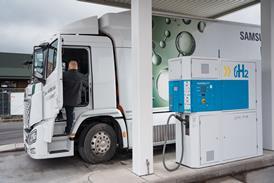Gridserve has secured £62.7 million Government funding for its “Electric Freightway” project as part of the recently announced ZERFD programme
Gridserve, best known for its extensive network of electric vehicle charging stations, has led a consortium of 33 partner to secure funding as part of the Government’s zero emission road freight demonstration (ZERFD) programme. As well as securing over £60 million from Government the consortium partners have also part-funded the project taking the investment to over £100 million, says Gridserve in a press announcement.

Electric Freightway will run until 2030 with a fleet of 140 eHGVs on the roads, supported by a new network of charging infrastructure at motorway service areas, truck stops and commercial depot charging stations. During this time the project also aims to trigger the uptake of more eHGVs using Electric Freightway charging infrastructure, together with the rollout of additional charging infrastructure in many more locations, without further Government subsidies.
In the initial two-year procurement phase, truck charging hubs will be installed at both motorway services areas and truck stops to support long distance travel around major trunk roads in the UK. The project also includes more than 10 commercial depot charging locations for eHGVs. In total, over 200 chargers capable of delivering 350kW will be installed, including an initial trial of two 1MW-capacity chargers. The new public charging infrastructure will be supplied by 100% net zero energy to ensure fleets are charged with net zero carbon energy.
Around 140 eHGVs will initially be brought into fleets by UK-based companies to use the new network, with multi-national and small businesses collaborating. Data collection will run for five years to collate valuable insights into the electrification of eHGVs to support the ongoing transition.
Gridserve is the lead partner among 33 companies that have come together to further the transition to net zero transport. Its role as project lead involves managing and delivering the Electric Freightway project and sourcing the vital data needed to inform further progress towards eHGV adoption. “This is a pioneering project for Gridserve,” says Gridserve CEO Toddington Harper. ”We look forward to demonstrating and proving that battery powered electric heavy goods vehicles represents the optimum path to choose, delivering significant benefits over other technology routes in respect of ease and scale of deployment, driver experience, and favourable economics.”
“Gridserve is proud to be leading the way in the switch to electric,” added Sam Clarke, Chief Vehicle Officer at Gridserve. ”Supporting UK logistics to move to battery electric vehicles will be instrumental in moving the needle on climate change and we are ready to deliver the infrastructure required in the fastest possible timeframes. There will be a lot to learn along the way but whilst this is just the beginning, the ambition will be to ensure this opportunity acts as a catalyst for continued uptake of electric Heavy Goods Vehicles and more broadly, commercial vehicle electrification now, and long into the future.”
Spanning a total of seven years (two years of infrastructure and fleet set up and five years of data collection) the aim of the project is to learn valuable insights into the electrification of eHGVs to support and accelerate the ongoing transition. Gridserve is joined by Hitachi Europe as its principal partner who will collate, analyse and report on data throughout the project, while a number of commercial vehicle operators have also joined the Electric Freightway initiative - AF Blakemore, Amazon, Fergusons Transport, Kuehne + Nagel, Maritime Transport, Royal Mail, Sainsbury’s and United Utilities Water - and will purchase or lease eHGVs from the project’s vehicle manufacturer partners. DAF, Volvo and Renault are listed as the truck suppliers, while the leasing partners are Mitsubishi Capital, Paccar Financial and Volvo Financial Services.


















